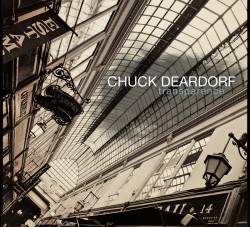MUSIC REVIEW BY Thomas Conrad, Jazz Times
Most major American cities (and, for that matter, most European ones) contain a jazz musician who is the default bassist of record. You run into them all over town, in all manner of ensembles, kicking ass and taking names.
In Seattle, Wash., it is Chuck Deardorf. He is known for making other people sound good, not leading his own projects. But Transparence argues that he is also a strong and smart bandleader. Deardorf blends various configurations of the 14 musicians and combines sessions recorded in several places over three years into a coherent album statement with continuity of tone. It is no mean trick. His own voice is the primary unifying factor. He is a quick, clear rhythm-section player and an articulate, interesting soloist on all of his instruments: acoustic, Toucan and Fender freltess basses and acoustic bass guitar.
The roster of 14 includes strong players from Seattle (alto saxophonist Hans Teuber, pianist Jovino Santos Nero, tenor saxophonist Richard Cole) and elsewhere (pianist Bill Mays, guitarists Bruce Forman and Rick Peckham). Most of the ensembles are duos, trios or quartets, and there is a string bias. (Four different guitarists interact with Deardorf's basses.) On "Alone Togeher," Forman's electric guitar and Deardorf's acoustic bass create resonant blends and suggestive contrasts. The same instrumental combination, with Rick Peckham on guitar, portrays Jobim's gentle "Zingaro" as something edgy and twangy.
Deardorf makes inspired song choices like "The Peacocks." The version here is one of the permanent recordings of Jimmy Rowles' atmospheric masterpiece. Deardorf and Mays and Teuber allow the song to keep its secrets. Together and apart, they just beautifully float with it.
In Seattle, Wash., it is Chuck Deardorf. He is known for making other people sound good, not leading his own projects. But Transparence argues that he is also a strong and smart bandleader. Deardorf blends various configurations of the 14 musicians and combines sessions recorded in several places over three years into a coherent album statement with continuity of tone. It is no mean trick. His own voice is the primary unifying factor. He is a quick, clear rhythm-section player and an articulate, interesting soloist on all of his instruments: acoustic, Toucan and Fender freltess basses and acoustic bass guitar.
The roster of 14 includes strong players from Seattle (alto saxophonist Hans Teuber, pianist Jovino Santos Nero, tenor saxophonist Richard Cole) and elsewhere (pianist Bill Mays, guitarists Bruce Forman and Rick Peckham). Most of the ensembles are duos, trios or quartets, and there is a string bias. (Four different guitarists interact with Deardorf's basses.) On "Alone Togeher," Forman's electric guitar and Deardorf's acoustic bass create resonant blends and suggestive contrasts. The same instrumental combination, with Rick Peckham on guitar, portrays Jobim's gentle "Zingaro" as something edgy and twangy.
Deardorf makes inspired song choices like "The Peacocks." The version here is one of the permanent recordings of Jimmy Rowles' atmospheric masterpiece. Deardorf and Mays and Teuber allow the song to keep its secrets. Together and apart, they just beautifully float with it.
Soundclips
Other Reviews of
"Transparence":
Cadence by Michael Steinman
Audiophile Audition by Pierre Giroux
All About Jazz by C. Michael Bailey
The Jazz Word by John Barron
Rifftides by Doug Ramsey
Jazz Society of Oregon by George Fendel
